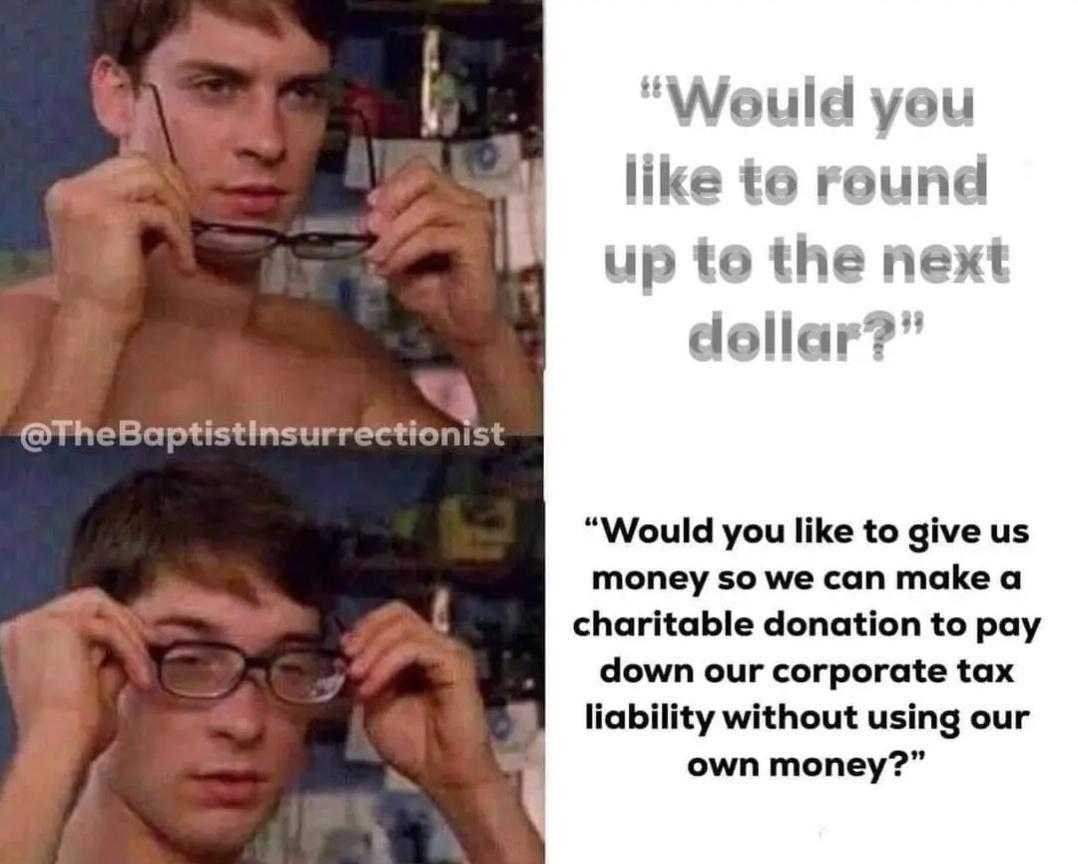this post was submitted on 28 Apr 2024
1019 points (90.7% liked)
memes
10297 readers
1741 users here now
Community rules
1. Be civil
No trolling, bigotry or other insulting / annoying behaviour
2. No politics
This is non-politics community. For political memes please go to !politicalmemes@lemmy.world
3. No recent reposts
Check for reposts when posting a meme, you can only repost after 1 month
4. No bots
No bots without the express approval of the mods or the admins
5. No Spam/Ads
No advertisements or spam. This is an instance rule and the only way to live.
Sister communities
- !tenforward@lemmy.world : Star Trek memes, chat and shitposts
- !lemmyshitpost@lemmy.world : Lemmy Shitposts, anything and everything goes.
- !linuxmemes@lemmy.world : Linux themed memes
- !comicstrips@lemmy.world : for those who love comic stories.
founded 1 year ago
MODERATORS
you are viewing a single comment's thread
view the rest of the comments
view the rest of the comments

Sure, but they also get to advertise that they donated X thousands of dollars to charity, while the truth is that the actual donors get no tax benefits at all. And like OP said, I'd rather use https://charitynavigator.org/ to do my own research before giving money to a corporation to donate to some organization that may be mishandling their funds.
Yup, it's not about stealing money it's about stealing goodwill.
The customers at the grocery store don't get thanked for donating $50 million to fighting awful childhood diseases, the grocery store does.
Then they can use that to argue they're good for the community, and deserve massive tax subsidies when they go to open their next store.
Unrelated, I've talked with people who work in the corporate philanthropy part of a business, and they're fine. They're just happy to get to use their position to organize charity, even though they know the point to the business is goodwill not giving.
It's other parts of the business that then milk that goodwill in incredibly scummy ways.
It's about stopping centralized programs which would actually address public needs. "We don't need universal healthcare, here's a charity that helps people with the bubonic plague!"
And in the worst cases, it's a grift for the wealthy. Where the charities exist to do scammy things like pay the founder to fly to luxury resorts to give a talk about why poverty is bad. Or to fund your family members solar manufacturing company. Or to put fuel into your church's private jet so you don't run the risk of catching demons from the public.
I don't think that's the intent behind it, but it's certainly an impact.
Charity is a stopgap to a systematic solution to addressing a lot of problems.
Your local food bank isn't bad, but it does hide the issue of food insecurity behind a solution that isn't guaranteed to be available to everyone like UBI or expanded food stamp access would.
Those cruddy charities do exist, but I think usually businesses try to avoid them because of the risk of backlash. The people running the programs usually try to do what they can to pick good charities at the least, since it's basically all the same to the business.
Not much that they can do about the CEOs spouse getting a spot on the charity board though.
So there is tax benefits, just with extra steps?
Yes, but not guaranteed, and usually "somewhere else".
Instead of avoiding paying $50M in federal taxes like a lot of people think, they might be forgiven $1M in taxes at the local level, pending some sustained employment level for some duration or another.
Point being, they're usually not planning to do the charity to save tax money, but to gain goodwill. They definitely intend to use that goodwill to make or save money later, and a common way is "you want us in your community, don't tax us in buying the land 🥺".
They might also just use it for advertising so people forgive 5% higher prices.
The person who paid the round up donation (i.e. you) is the person allowed to use the donation for their tax benefit. If you save receipts with round up donations, you can deduct them on your taxes, but no one does that.
It's difficult for individuals to get deductions for charitable contributions under current tax code. You've got to pretty much donate upwards of twenty thousand dollars before any benefits.
That stated number is different for every situation and is a rough estimate of average of what I see on returns.
If Trump tax sunsets in 2025, things will revert back to more easily getting benefits from donations, but that's a long way away and entirely reliant on who's running the show at that time.
Thats only because of how the standard deduction works; If you have to itemize, then any amount of charitable donations can be deducted (up to like 60% of your AGI i think). Basically anyone needs to "outweigh" the standard deduction with their own deductions, because doing otherwise is worse. Technically i think you could forgo the standard deduction and use your own, even if you don't go over the standard deduction, but why would you?
That's the point: almost nobody benefits from charitable donations because almost everybody takes the standard deduction, so "but you can get tax benefits for donating!" is a red herring in almost all cases.
That catch on current code is that they combined exemption with standard deduction. Makes it quite a bit more difficult than the before times.
I'll leave it at that as I'm generally overwhelmed with unparalleled Internet tax expertise any time the subject arises.